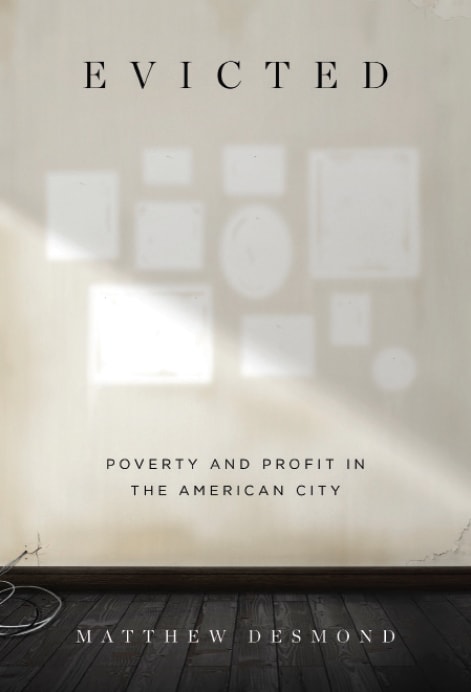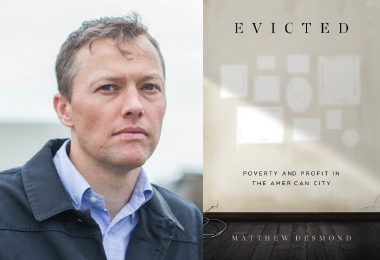[vc_row][vc_column width=”1/4″][vc_column_text] [/vc_column_text][/vc_column][vc_column width=”3/4″][vc_column_text]
[/vc_column_text][/vc_column][vc_column width=”3/4″][vc_column_text]
Evicted
Matthew Desmond
Crown, 432 pages
[/vc_column_text][vc_column_text]
Reviewed by Josh Perme | April 5, 2017
[/vc_column_text][/vc_column][/vc_row][vc_row][vc_column][/vc_column][/vc_row][vc_row][vc_column][vc_column_text]
Evicted: Poverty and Profit in the American City is arguably one of the most important books published in 2016. Focused on eight low-income families and their two landlords in Milwaukee, Wisconsin, Matthew Desmond shines a new light on the way we look at poverty. He argues that we have missed a fundamental issue in addressing poverty in America, writing, “We have failed to fully appreciate how deeply housing is implicated in the creation of poverty.” This work is his effort to bring us into that conversation.
Desmond writes with a beautiful, if at times haunting, straightforwardness about the people and events in his story. In these pages we spend time with Lamar, a disabled veteran without legs who crawls across the floor to paint his landlord’s property in an effort to work off part of his rent. We meet Arleen, who makes eighty-eight phone calls trying to find a landlord who will rent to her, only to be rejected because she has children. When Ned and Pam are evicted, Ned gets fired from his job for helping his family move. The events described in Evicted are not unique to Milwaukee, but instead are becoming more commonplace in American cities and towns.
At its core Evicted is an ethnography, a detailed study of real people in a real place. In addition to the narratives, it is the research and statistical data that is the real focus of this book. It all flows together to make a compelling and convicting case for us to take seriously the role of housing in our conversations around poverty.
At a time when more and more urban residents are renters, this book gives readers much to think about. The federal government considers housing to be affordable at or below 30 percent of a family’s income. According to Desmond’s data, one in four poor families dedicates more than 70 percent of their income to rent and electricity. As of 2013, one in five of all Americans who rent spent more than 50 percent of their income on rent. These are chilling numbers.
Desmond does not just state the facts, however; in the epilogue he issues both a challenge and provides hope. He makes a compelling case for a universal housing voucher program that he believes would change the face of poverty in America. Ultimately, he asks the question, “Do we believe that the right to a decent home is what it means to be an American?”
As Christians, our response to that question is critically important. Do we believe that having a decent home is a right? That being human, uniquely crafted in God’s own image, includes the right to a home? I encourage everyone to read through Evicted with a Bible nearby and wrestle with that question.
Desmond writes, “The home is the center of life. It is a refuge from the grind of work, the pressure of school, and the menace of the streets. We say that at home, we can ‘be ourselves.’ Everywhere else, we are someone else. At home, we remove our masks. The home is the wellspring of personhood.”
In this book Desmond encourages us to work to ensure that everyone has a decent place they can call home.
[/vc_column_text][/vc_column][/vc_row][vc_row][vc_column][vc_column_text]Want to learn more? See one way that the covenant is working towards holistic economic restoration in local communities by visiting http://www.launch50.org/
[/vc_column_text][/vc_column][/vc_row]














